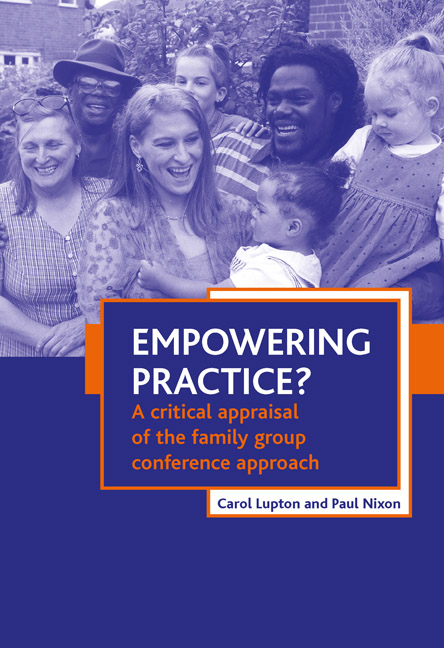Book contents
- Frontmatter
- Contents
- Preface
- Acknowledgements
- Introduction
- one The dilemmas of empowerment
- two Partnership and empowerment in children’s services
- three Lessons from New Zealand
- four Empowering professionals?
- five International perspectives
- six Empowerment in process?
- seven Assessing outcomes in child welfare
- eight Empowering outcomes?
- nine Conclusion
- Bibliography
- Index
five - International perspectives
Published online by Cambridge University Press: 05 July 2022
- Frontmatter
- Contents
- Preface
- Acknowledgements
- Introduction
- one The dilemmas of empowerment
- two Partnership and empowerment in children’s services
- three Lessons from New Zealand
- four Empowering professionals?
- five International perspectives
- six Empowerment in process?
- seven Assessing outcomes in child welfare
- eight Empowering outcomes?
- nine Conclusion
- Bibliography
- Index
Summary
Introduction
Family group conferences reflect, in their philosophy and emphasis on the participation of families, young offenders and victims, cultural sensitivity and consensus decision-making and, in their practice, a capacity to be translated into diverse social contexts and jurisdictions. (Hudson et al, 1996, p 221)
Following their development in New Zealand, international interest in family group conferences has grown rapidly. Although retaining some common core components, the precise shape and nature of the FGC approach has varied as it has been transplanted into different national jurisdictions. There are also interesting international and intranational variations in terms of the extent to which and ways in which the FGC approach has been evaluated. While it cannot pretend to be exhaustive, this chapter provides a brief overview of some of the major international developments in the FGC approach, describing their main similarities and differences. It goes on to examine the key findings of the available research on the operation of FGCs and highlights the central issues and debates emerging from this research. While the overview of the development of the approach indicates the range of social problems and issues with which FGCs are being used, the examination of the messages from existing research focuses predominantly on its operation in the child welfare context.
The international development of the FGC approach
Some of the earliest developments outside New Zealand occurred in the United States where initiatives similar to the FGC model developed in a number of different parts of the country. What is referred to as the family group decision-making approach (FGDM) has been in use since the early 1990s in child welfare work (Graber et al, 1996) and is being practised in around 10 states at the time of writing, although typically as pilot projects (Merkel-Holguin et al, 1997; Merkel-Holguin, 1996, 1998). While there are a number of different variants of FGDM, including the New Zealand FGC model itself, one of the most prevalent is the ‘family unity meeting’ – developed in Oregon around the same time as the FGCs in New Zealand and subsequently incorporating elements of the latter. This differs from the FGC insofar as the facilitator remains throughout the meeting (Graber et al, 1996) and there is no private planning time for families. Moreover, the underlying assumptions are very different.
- Type
- Chapter
- Information
- Empowering Practice?A Critical Appraisal of the Family Group Conference Approach, pp. 93 - 114Publisher: Bristol University PressPrint publication year: 1999



